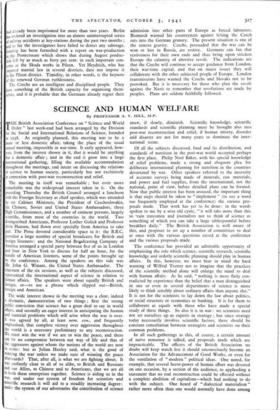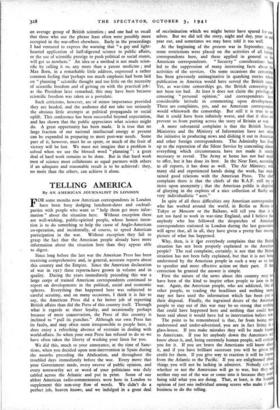SCIENCE AND HUMAN WELFARE
By PROFESSOR A. V. HILL, M.P.
HE British Association Conference on " Science and World Order " last week-end had been arranged by the Division for the Social and International Relations of Science, founded in 1938. As originally planned, this meeting was to be a more or less domestic affair, taking the place of the usual annual meeting, impossible in war-time. It early appeared, how- ever, from the interest shown in it, that it would be anything but a domestic affair ; and in the end it grew into a large international gathering, filling the available accommodation throughout the meetings, and intent on discussing the relations of science to human society, particularly but not exchisively in connexion, with post-war reconstruction and relief.
The meeting in itself was remarkable ; but even more remarkable was the widespread interest taken in it. On the preceding Thursday the British Council arranged a luncheon with the Foreign Secretary as chief speaker, which was attended by six Cabinet Ministers, the President of Czechoslovakia, the Chinese, Soviet and United States Ambassadors, three .gh Commissioners, and a number of eminent persons, largely scientific, from most of the countries in the world. Two distinguished Americans, Professor Luther Gulick and Professor Alvin Hansen, had flown over specially from America to take part. The Press devoted considerable space to it: the B.B.C. provided a large number of special broadcasts for British and foreign listeners: and the National Brqadcasting Company of America arranged a special party between five of us in London and four in New York to discuss for half an hour, for the benefit of American listeners, some of the points brought 'up by the conference. Among the speakers on this side was Mr. John G. Winant, the United States Ambassador. The chairmen of the six sessions, as well as the subjects discussed, represented the international aspect of science in relation to human affairs. The speakers were about equally British and foreign, or—to ,use a phrase which slipped out—British, foreign and American.
The wide interest shown in the meeting was a clear, indeed a dramatic, domonstration of two things ; first the strong public conviction that science has a great deal to say in world affairs, and secondly an eager interest in anticipating the human and material problems which will arise when the war is over. It was agreed by all, at least nem. con., and frequently emphasised, that complete victory over aggression throughout the world is a necessary preliminary to any reconstruction. We must win the war if we are to win the peace, and there can be no compromise between our way of life and that of the aggressors against whom the nations of the world are now In arms : but as Julian Huxley said, what is the good of Winning the war unless we make sure of winning the peace afterwards? That, after all, is what we are fighting about. It was perfectly clear to all of us alike, to British and Russians and our Allies, to Chinese and to Americans, that we are all in both these enterprises together. Science is aiding us in the War, and under our system of freedom for scientists and scientific research it will aid to a steadily increasing degree: tinder the system of our adversaries the contribution of science must, if slowly, diminish. Scientific knowledge, scientific standards and scientific planning must be brought also into post-war reconstruction and relief, if human misery, disorder add disaster are not for many years to dominate the inter- national scene.
Of all the subjects discussed, food and its distribution, and standards of nutrition in the post-war world occupied perhaps the first place. Philip Noel Baker, with his special knowledge of relief problems, made a strong and eloquent plea for deliberate international planning for nutrition in the countries devastated by war. Other speakers referred to the necessity of accurate surveys being made of minerals, raw materials, and power and fuel supplies, from the international, not the national, point of view, before detailed plans can be formed. Now that public interest has been aroused, the important thing is that steps should be taken to " implement " (to use a word too frequently employed at the conference) the various pro- posals made. That work has yet to be done: in the words spoken to me by a wise old cynic, " it will take more than this to ,rain statesmen and journalists not to think of science as something of which you can take a large tablespoonful before breakfast daily." The British Association is well aware of this, and proposes to set up a number of committees to deal at once with the various questions raised at the conference and the various proposals made.
The conference has provided an admirable opportunity of emphasising the role which science, scientific research, scientific knowledge and orderly scientific planning should play in human affairs. In this, however, we must bear in mind the hard warning of Wilfrid Trotter not to imagine that the practices of the scientific method alone• will enlarge the mind to deal with human affairs. As he said, " nothing is more flatly con- tradicted by experience than the belief that a man distinguished in one or even in several departments of science is more likely to think sensibly about ordinary affairs than anyone else." It is not for the scientists to lay down the law about politics, or social structure or economics or banking. It is for them to collaborate as equals with those who have made a special study of these things. So also it is in war: we scientists need not set ourselves up as experts in strategy ; but since strategy today necessarily involves scientific factors, there should be constant consultation between strategists and scientists on their common problems.
In all such gatherings as this, of course, a certain amount of naïve nonsense is talked, and proposals made which are impracticable. The officers of the British Association no doubt will keep watch lest it should unconsciously become an Association for the Advancement of Good Works, or even for the ventilation of " modern " political ideas. One noted, for example, that several horse-power of human effort was devoted on one occasion, by a section of the audience, to applauding a statement that no real reconstruction could be effected without a complete abolition of capitalism—which had nothing to do with the subject. One heard of " dialectical materialism " rather more often than one would normally have done among an average group of British scientists ; and one had to recall that those who use the phrase least often were possibly more occupied in the war-effort elsewhere. Early in the proceedings I had ventured to express the warning that " a gay and light- hearted application of half-digested science to public affairs, or the use of scientific prestige to push political or social stunts, will get us nowhere." An idea or a method is not made scien- tific by calling it so, any more than a patent medicine ; and Max Born, in a remarkable little address, expressed a rather common feeling that 'perhaps too much emphasis had been laid on " planning " scientific thought and too little on the necessity of scientific freedom and of getting on with the practical job : as the President later remarked, this may have been because scientific freedom was taken as a postulate.
Such criticisms, however, are of minor importance provided they are heeded, and the audience did not take too seriously the obvious little attempts at political propaganda or social uplift. This conference has been successful beyond expectation, and has shown that the public appreciates what science might do. A great opportunity has been made; It is true that no large fraction of our national intellectual energy at present can be expanded in preparing to meet post-war needs. Some part of it, however, must be so spent, or much of the fruit of victory will be lost. We must not imagine that a problem is solved when we use the blessed word " planning " : a great deal of hard work remains to be done. But in that hard work men of science must collaborate as equal partners with others if an adequate and reasonable result is to be achieved: they, no mote than the others, can achieve it alone.



























 Previous page
Previous page